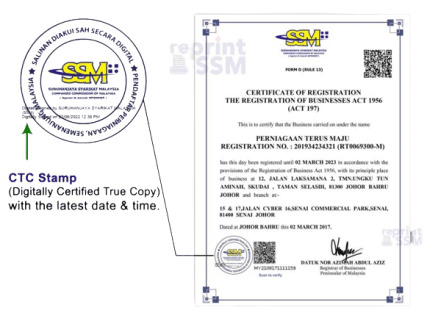Recently, the Companies Commission of Malaysia (SSM) has imposed stringent penalties on companies that fail to include their Company Registration Number (CRN) in public communications, such as newspapers, social media, and other channels. This enforcement stems from Section 30 of the Companies Act 2016 (CA2016), which mandates that all registered companies in Malaysia, regardless of their type, must display their CRN alongside their company name. Including the CRN is not just a regulatory requirement but also a crucial element in establishing transparency, trust, and legitimacy in the business environment.
In this article, we delved into the significance of the Company Registration Number (CRN) in Malaysia, highlighting its mandatory inclusion in public communications as per Section 30 of the Companies Act 2016 (CA2016).
Understanding Section 30 of CA2016
Section 30 of the Companies Act 2016 (CA2016) clearly stipulates that a company must display its registered name and registration number at its registered office, all business locations, and places where its books are kept. Moreover, the registered name and CRN must be included on all business letters, notices, official publications (including electronic formats), websites, bills of exchange, promissory notes, cheques, orders, invoices, receipts, and other business documentation. This legal requirement ensures that the SSM company registration number is omnipresent in a company’s operations, making it easily accessible for anyone wishing to verify the company’s legitimacy.
The Importance of Including the Company Registration Number

The mandatory inclusion of the Company Registration Number is driven by several important factors. One of the primary reasons is the reduction of scams. By making it mandatory for companies to display their CRN, it becomes easier for the public and authorities to verify the legitimacy of a business, significantly reducing the risk of fraudulent activities. This measure is particularly important in an era where online scams and fraudulent business operations are increasingly sophisticated.
Additionally, the requirement of registering a company’s website and social media is also needed for registration to provide an extra layer of transparency and accountability. This ensures that businesses are not only easily identifiable through their Company Registration Number (CRN) but also through their digital presence, making it more challenging for fraudulent entities to operate unnoticed. By linking the CRN with online platforms, the public can more readily verify the legitimacy of a company and access reliable information about its operations and activities, thus fostering a safer and more transparent business environment.
Another key reason is the promotion of transparency. Including the SSM registration number in public communications allows stakeholders—such as customers, suppliers, and investors—to access reliable information about the company. This transparency is fundamental in building trust and credibility, which are essential components of successful business relationships. Without the CRN, it becomes challenging for the public to ascertain the authenticity of advertisements or announcements. With the CRN, individuals can use various legal search engines, such as SSM e-Info, e-Search, and CTOS, to verify the existence and legitimacy of a company, ensuring that they are engaging with a legitimate entity.
How to Check Company Registration Number in SSM?
Understanding how to check a company registration number in SSM is crucial for anyone looking to verify a business’s legitimacy. The SSM offers several online tools for this purpose, including the SSM e-Info and SSM e-Search platforms. To check a company’s registration number, follow these simple steps:
- Access the SSM Website: Start by visiting the official SSM website and navigating to the e-Info or e-Search service.
- Enter the Company Name or Registration Number: In the search bar, you can enter either the company’s name or its CRN. You can also input the business’s name if you’re checking for the SSM company registration number.
- View the Company Details: The search results will display the company’s registration details, including its CRN, date of incorporation, and status. This information can help you verify the company’s legitimacy.
By regularly checking a company’s CRN through SSM’s services, businesses and individuals can ensure they are dealing with legitimate entities, thereby reducing the risk of fraud.
1. Legal Implications of Non-Compliance

Non-compliance with Section 30 of CA2016 can lead to severe legal consequences for companies. The SSM has the authority to impose penalties and fines on companies that fail to include their CRN in public communications and official documents. These penalties can be substantial, depending on the nature and frequency of the violations. In some cases, persistent non-compliance can lead to more serious legal actions, including court proceedings. Therefore, it is in the best interest of companies to ensure that they adhere strictly to this requirement to avoid unnecessary legal complications and financial penalties.
2. Role of the Company Registration Number in Branding
Beyond regulatory compliance, the CRN also plays a significant role in branding. A company that consistently includes its SSM company registration number in all public materials projects a professional image, distinguishing itself from unregistered or potentially fraudulent businesses. The CRN acts as a seal of authenticity, reinforcing the company’s commitment to transparency and integrity. In an increasingly competitive market, where trust is a valuable commodity, the CRN can be a subtle yet powerful tool in enhancing a company’s brand image.
3. Simplifying Business Interactions with CRN
The inclusion of the CRN in all business communications simplifies interactions with customers, suppliers, and financial institutions. When the SSM registration number is readily available, it facilitates smoother transactions, contract signing, and partnerships by providing quick access to verifiable company information. This ease of verification can lead to more efficient business dealings, reducing the time and effort required to establish trust between parties. In a fast-paced business environment, where time is often of the essence, the CRN serves as a critical piece of information that accelerates decision-making processes.
4. Impact on Financial Transactions and Banking
Banks and financial institutions often require a company’s CRN for various processes, including opening accounts, securing loans, and conducting transactions. The CRN is essential for these institutions to verify the legal existence and status of a company before engaging in any financial dealings. Without a CRN, companies may face delays or difficulties in accessing banking services, which could hinder their operations and growth. Therefore, including the CRN in all relevant documents is crucial for maintaining smooth and efficient financial operations.
5. Compliance with E-Invoice Implementation

As Malaysia moves towards the implementation of the E-Invoice system in 2024, businesses must comply with the requirement to include their CRN and Tax Identification Number in their invoices. This compliance is essential for participating in the e-invoice system, which aims to streamline tax administration and improve efficiency across the business landscape. The e-invoice system is part of Malaysia’s broader digital transformation strategy, and companies that fail to comply with the CRN requirement may find themselves unable to participate fully in this new digital economy.
The SSM New Registration Number: A Modern Update
Under the Companies Act 2016, the Companies Commission of Malaysia (SSM) has introduced a significant update to the company registration number format, transitioning to a new SSM 12-digit system. This enhanced format is more than just a change in digits; it represents a strategic move towards greater transparency and accountability in the Malaysian business environment.
The 12-digit registration number is structured to provide critical information at a glance. The first four digits indicate the year of incorporation, offering immediate insight into the company’s age. The fifth and sixth digits denote the type of entity, making it easier for stakeholders to identify the business structure, whether it be a private limited company, a public limited company, or another entity type. The final six digits are a unique identifier assigned to each registered company.

This modern update is part of SSM’s broader initiative to streamline business operations and improve the public’s ability to verify company details. By simplifying the process of determining a company’s year of incorporation and entity type, the new format aids in reducing potential confusion and errors, especially in legal and financial transactions. Furthermore, this change aligns with SSM’s commitment to enhancing the overall clarity and accessibility of corporate information, ultimately fostering a more transparent, trustworthy, and efficient business environment in Malaysia.
Conclusion
The mandatory inclusion of the Company Registration Number in all public communications and documentation is a crucial step towards enhancing transparency, reducing fraud, and ensuring compliance with regulatory requirements in Malaysia. It is essential for all businesses to adhere to this requirement to build trust, maintain credibility, and participate effectively in the evolving business landscape. The updated 12-digit registration number format further simplifies the verification process, contributing to a more transparent and reliable business environment. By understanding and complying with these requirements, businesses not only avoid penalties but also contribute to a more trustworthy and transparent corporate ecosystem in Malaysia.
If you’re looking to ensure your business remains compliant and well-prepared for the future, NKH Group can help. With our comprehensive business valuation services, we provide in-depth insights and strategies to strengthen your company’s financial standing and compliance with legal requirements. Contact us today to discover how we can assist you in navigating the complexities of the business landscape in Malaysia.
Kim Heng is an accounting and taxation professional whose sterling reputation has drawn countless clients to the NKH Group. When the GST was first introduced, he was commissioned to give 100+ talks on GST implementation as well as over 20++ talks on E- Invoice implementation by multiple businesses and industry associations, showing the depth of their confidence in his expertise. In the following years, Kim Heng would go on to share his knowledge on (among others) branding, tax planning, and fundraising at 20+ seminars organised by business associates that were widely attended by the public. He has over 20 years of experience consulting and advisory on taxation, corporate structure planning, business valuer, company secretarial administration, constitution advisory, and etc.





